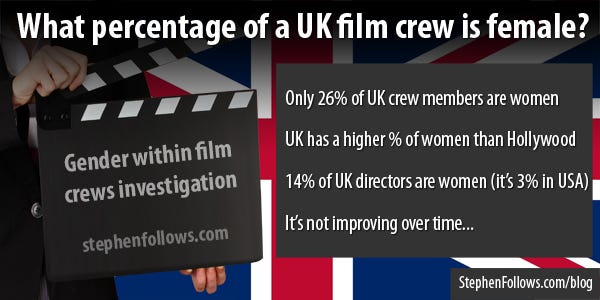What percentage of a UK film crew is female?

Last month, I published a report into what percentage of crews on the top US grossing films of the past 20 years are women. I found that, on average, women made up only 23% of a typical film crew and in some jobs such as cinematography and composing, it was around 2%. The results were reported widely and sparked a healthy debate about the causes and what, if anything, should be done.
One consequence was that I was asked by a number of people what the situation is in the UK. This project was far too large to fit into a single blog post, so I've written it up as a PDF report. It spans 17 pages and breaks down the results in much more detail. The report is free and all you need to do to get it is sign up to my e-mail list. I send out one email every week or fortnight, to highlight new articles on this blog around film data and statistics.
The UK results in summary
I studied 2,336 UK films to assess the gender of their crews. In summary...
Between 2009-13, women made up 26.2% of crew members on British films.
This compares favourably with top US films over the same period (22.2%)
Of all the departments, the Transportation department is the most male, with only 7.7% women.
The only departments to have a majority of women are Make-up, Casting, Costume and Production.
Visual Effects is the largest department on most major movies and yet only has 16.5% women.
6.4% of composers on UK films were women.
14% of UK films had a female director, compared with 3% of top US films.
The percentage of women on British films has barely changed in the past five years.
On average, 26% of UK film crew is female
The only departments which have a majority of women are make-up, Costume / Wardrobe, Casting and Production. Arguably, the roles which have the largest impact on the final story are writers, producers and directors. Therefore, the fact that women only account for 15%, 27% and 14% respectively must have an effect on the representation of female issues and viewpoints on-screen. You can see my research into whether audiences care about the gender of the key creative roles here stephenfollows.com/do-women-prefer-films-made-by-female-filmmakers
Has UK female representation changed over time?
Nope. Note: this is from a slightly smaller sub-set of films as my complete dataset of all UK movies starts in 2008. Therefore, the chart above relates to UK films budgeted over £1 million. If you would like to see the year-by-year stats for all UK films since 2009 then please sign up to the full report at the top of the page.
How does the UK compare with America?
Today's research focuses on feature films shot in the UK and released between 2009 and 2013. My previous research looked at the top 100 grossing films at the US box office, the vast majority of which were made and distributed by the major Hollywood studios. Direct comparison between the two sets of results is a little less robust than I would normally like as they are studying slightly different things. However, I have run spot-checks and found no significant difference between the overall percentage of women in all UK films and that of just the highest grossing UK films. This means that comparing the UK film results with the top grossing US films does reveal useful information about the difference between the two countries. The biggest difference between the UK films and top grossing US films is in the role of Director. The representation of female directors was 4.5 times higher in UK films than top US films. Editors are the only role which show a more balanced situation in top US films compared with UK films.
How does the UK compare with America over the past five years?
It's not just the UK which is failing to increase its proportion of women in film crews; the top grossing films in America also show little improvement over time. In fact, my previous research showed that the percentage of women fell from 22.7% in 1994 to 21.8% in 2013.
Epilogue
This week's article was from two sets of data - UK films budgeted over £1 million since 2003 and all films since 2008. Most of the results relate to UK films of all budget ranges, released between 2009 and 2013 inclusive. I used the 'over £1 million films' list to look at the trends over the past decade. If any one has complete records for films made in other countries over a similar period then I would have happy to research the gender split of those films. Just contact me. We are fortunate in the UK that we have an impartial, well-funded and hard-working body in the BFI. Due to their work, we have reliable data on local films, meaning research such as today's can be seen as fairly complete. My data sources, methodology and limitations of this research are detailed in the full report: for brevity's sake I have decided to leave them out of this blog article. If you're interested in seeing further results, or understanding how I carried out this research then please download the full PDF report as detailed at the top of this article.


